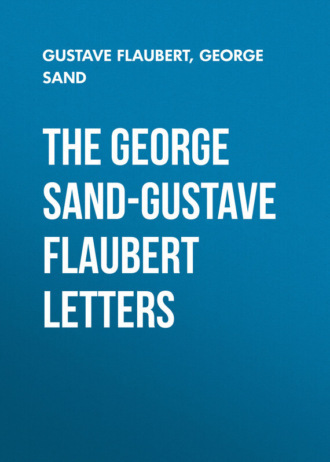 полная версия
полная версияThe George Sand-Gustave Flaubert Letters
Maurice's love. Entomology has taken possession of him this year; he discovers marvels. Embrace your mother for me, and take good care of her. I love you with all my heart.
G. Sand
LXI. To GUSTAVE FLATUBERT
Nohant, 24 July, 1867
Dear good friend, I spent three weeks in Paris with my children, hoping to see you arriving or to receive a line from you which would tell me to come and embrace you. But you were HEAD OVER HEELS and I respect these crises of work; I know them! Here am I back again in old Nohant, and Maurice at Nerac terminating by a compromise the law-suit which keeps him from his inheritance. His agreeable father stole about three hundred thousand francs from his children in order to please his cook; happily, although Monsieur used to lead this edifying life, I used to work and did not cut into my capital. I have nothing, but I shall leave the daily bread assured.
They write me that Villemer goes well. Little Aurore is as pretty as anything and does a thousand gracious tricks. My daughter Lina is always my real daughter The OTHER is well and is beautiful, that is all that I ask of her.
I am working again; but I am not strong. I am paying for my energy and activity in Paris. That does not make any difference, I am not angry against life, I love you with all my heart. I see, when I am gloomy, your kind face, and I feel the radiant power of your goodness. You are a charm in the Indian summer of my sweet and pure friendships, without egoisms, and without deceptions in consequence.
Think of me sometimes, work well and call me when you are ready to loaf. If you are not ready, never mind. If your heart told you to come here, there would be feasting and joy in the family. I saw Sainte-Beuve, I am content and proud of him.
Good night, friend of my heart. I embrace you as well as your mother.
G. Sand
LXII. TO GUSTAVE FLAUBERT, at Paris
Nohant, 6 August, 1867
When I see how hard my old friend has to work in order to write a novel, it discourages my facility, and I tell myself that I write BOTCHED literature. I have finished Cadio; it has been in Buloz' hands a long time. I am writing another thing,[Footnote: Mademoiselle Merquem.] but I don't see it yet very clearly; what can one do without sun and without heat? I ought to be in Paris now, to see the Exposition again at my leisure, and to take your mother to walk with you; but I really must work, since I have only that to live on. And then the children; that Aurore is a wonder. You really must see her, perhaps I shall not see her long, If I don't think I am destined to grow very old; I must lose no time in loving!
Yes, you are right, it is that that sustains me. This hypocritical fit has a rough disillusionment in store for it, and one will lose nothing by waiting. On the contrary, one will gain. You will see that, you who are old though still quite young. You are my son's age. You will laugh together when you see this heap of rubbish collapse.
You must not be a Norman, you must come and see us for several days, you will make us happy; and it will restore the blood in my veins and the joy in my heart.
Love your old troubadour always and talk to him of Paris; a few words when you have the time.
Outline a scene for Nohant with four or five characters, we shall enjoy it. We embrace you and summon you.
G. Sand
LXIII. TO GUSTAVE FLAUBERT, at Croisset
Nohant, 18 August, 1867
Where are you, my dear old fellow? If by chance you should be in Paris, during the first few days of September, let us try to see each other. I shall stay there three days and I shall return here. But I do not hope to meet you there. You ought to be in some lovely country, far from Paris and from its dust. I do not know even if my letter will reach you. Never mind, if you can give news of yourself, do so. I am in despair. I have lost suddenly, without even knowing that he was ill, my poor dear, old friend, Rollinat, an angel of goodness, of courage, of devotion. It is a heavy blow for me. If you were here you would give me courage; but my poor children are as overwhelmed as I am. We adored him, all the countryside adored him.
Keep well, and think sometimes of your absent friends. We embrace you affectionately. The little one is very well, she is charming.
LXIV. TO GUSTAVE FLAUBERT, at Paris
Nohant, August, 1867
I bless you, my dear old fellow, for the kind thought that you had of coming; but you were right not to travel while you were ill. Ah! my God, I dream of nothing but illness and unhappiness: take care of yourself, my old comrade. I shall go to see you if I can pull myself together; for, since this new dagger-thrust, I am feeble and crushed and I have a sort of fever. I shall write you a line from Paris. If you are prevented, you must answer me by telegram. You know that with me there is no need of explanation: I know every hindrance in life and I never blame the hearts that I know. – I wish that, right away, if you have a moment to write, you would tell me where I should go for three days to see the coast of Normandy without striking the neighborhood where "THE WORLD" goes. In order to go on with my novel, I must see a countryside near the Channel, that all the world has not talked about, and where there are real natives at home, peasants, fisherfolk, a real village in a corner of the rocks. If you are in the mood we will go there together. If not, don't bother about me. I go everywhere and I am not disturbed by anything. You told me that the population of the coasts was the best in the country, and that there were real dyed-in-the-wool simple-hearted men there. It would be good to see their faces, their clothes, their houses, and their horizons. That is enough for what I want to do, I need only accessories; I hardly want to describe; SEEING it is enough in order not to make a false stroke. How is your mother? Have you been able to take her to walk and to distract her a little? Embrace her for me as I embrace you.
G. Sand
Maurice embraces you; I shall go to Paris without him: he is drawn on the jury for the 2 September till…no one knows. It is a tiresome task. Aurore is very cunning with her arms, she offers them to you to kiss; her hands are marvels and they are incredibly clever for her age.
Au revoir, then, if I can only pull myself out of the state I am now in. Insomnia is the devil; in the daytime one makes a lot of effort not to sadden others. At night one falls back on oneself.
LXV. TO GUSTAVE FLAUBERT, at Croisset
Nohant, 10 September, 1867
Dear old fellow,
I am worried at not having news of you since that illness of which you spoke. Are you well again? Yes, we shall go to see the rollers and the beaches next month if you like, if your heart prompts you. The novel goes on apace; but I shall besprinkle it with local color afterwards.
While waiting, I am still here, stuck up to my chin in the river every day, and regaining my strength entirely in this cold and shady stream which I adore, and where I have passed so many hours of my life reviving myself after too long sessions in company with my ink- well. I go definitely to Paris, the 16th; the 17th at one o'clock, I leave for Rouen and Jumieges, where my friend Madame Lebarbier de Tinan awaits me at the house of M. Lepel-Cointet, the landowner; I shall stay there the 18th so as to return to Paris the 19th. Will it be inconvenient if I come to see you? I am sick with longing to do so; but I am so absolutely forced to spend the evening of the 19th in Paris that I do not know if I shall have the time. You must tell me. I can get a word from you the 16th in Paris, 97 rue des Feuillantines. I shall not be alone; I have as a travelling companion a charming young literary woman, Juliette Lamber. If you were lovely, lovely, you would walk to Jumieges the 19th. We would return together so that I could be in Paris at six o'clock in the evening at the latest. But if you are even a little bit ill still, or are PLUNGED in ink, pretend that I have said nothing, and prepare to see us next month. As for the WINTER walk on the Norman coast, that gives me a cold in my back, I who plan to go to the Gulf of Juan at that time.
I have been sick over the death of my friend Rollinat. My body is cured, but my soul! I should have to stay a week with you to refresh myself in your affectionate strength; for cold and purely philosophical courage to me, is like cauterizing a wooden leg.
I embrace you and I love you (also your mother). Maurice also, what
French! One is happy to forget it, it is a tiresome thing.
Your troubadour
G. Sand
LXVI. TO GEORGE SAND
Dear master,
What, no news?
But you will answer me since I ask you a service. I read this in my notes: "National of 1841. Bad treatments inflicted on Barbes, kicks on his breast, dragged by the beard and hair in order to put him in an in-pace. Consultation of lawyers signed: E. Arago, Favre, Berryer, to complain of these abominations."
Find out from him if all that is true; I shall be obliged.
LXVII. TO GUSTAVE FLAUBERT, at Croisset
Paris, Tuesday, 1st October, 1867
Dear friend, you shall have your information. I asked Peyrat last evening, I am writing today to Barbes who will answer directly to you.
Where do you think I have come from? From Normandy. A charming opportunity took me there six days ago. I had been enchanted with Jumieges. This time I saw Etretat, Yport, the prettiest of all the villages, Fecamp, Saint-Valery, which I knew, and Dieppe, which dazzled me; the environs, the chateau d'Arques, Limes, what a country! And I went back and forth twice within two steps of Croisset and I sent you some big kisses; always ready to return with you to the seaside or to talk with you at your house when you are free. If I had been alone, I should have bought an old guitar and should have sung a ballad under your mother's window. But I could not take a large family to you.
I am returning to Nohant and I embrace you with all my heart.
G. Sand
I think that the Bois-Dore is going well, but I don't know anything about it. I have a way of my own of being in Paris, namely, being at the seaside, which does not keep me informed of what is going on. But I gathered gentians in the long grass of the immense Roman fort of Limes where I had quite a STUNNING view of the sea. I walked out like an old horse, but I am returning quite frisky.
LXVIII. TO GEORGE SAND
At last, at last, I have news of you, dear master, and good news, which is doubly agreeable.
I am planning to return to my home in the country with Madame Sand, and my mother hopes that will be the case. What do you say? For, with all that goes on, we never see each other, confound it!
As for my moving, it is not that I lack the desire of being free to move about. But I should be lost if I stirred before I finish my novel. Your friend is a man of wax; everything gets imprinted on him, is encrusted on him, penetrates him. If I should visit you, I should think of nothing but you and yours, your house, your country, the appearance of the people I had met, etc. I require great efforts to gather myself together; I always tend to scatter myself. That is why, dear adored master, I deprive myself of going to sit down to dream aloud in your house. But, in the summer or autumn of 1869, you shall see what a fine commercial traveller I am, once let loose to the open air. I am abject, I warn you.
As to news, there is a quiet once more since the Kerveguen incident has died its beautiful death. Was it not a farce? and silly?
Sainte-Beuve is preparing a lecture on the press law. He is better, decidedly. I dined Tuesday with Renan. He was marvellously witty and eloquent, and artistic! as I have never seen him. Have you read his new book? His preface causes talk. My poor Theo worries me. I do not think him strong.
LXIX. TO GUSTAVE FLAUBERT, at Paris
Nohant, 12 October, 1867
I have sent your letter to Barbes; it is fine and splendid, as you are. I know that the worthy man will be glad of it. But as for me, I want to throw myself out of the window; for my children are unwilling to hear of my leaving so soon. Yes, it is horrid to have seen your house four times without going to see you. But I am cautious to the point of fear. To be sure the idea of summoning you to Rouen for twenty minutes did occur to me. But you are not, as I am, on tiptoe, all ready to start off. You live in your dressing gown, the great enemy of liberty and activity. To force you to dress, to go out, perhaps in the middle of an absorbing chapter, and only to see someone who does not know how to say anything quickly, and who, the more he is content, the stupider he is, – I did not dare to. Here I am obliged to finish something which drags along, and before the final touch I shall probably go to Normandy. I should like to go by the Seine to Honfleur. It will be next month, if the cold does not make me ill, and I shall try this time to carry you away in passing. If not, I shall see you at least, and then I shall go to Provence.
Ah! if I could only take you there! And if you could, if you would, during the second week in October when you are going to be free, come to see me here! You promised, and my children would be so happy if you would! But you don't love us enough for that, scoundrel that you are! You think that you have a lot of better friends: you are very much mistaken; it is always one's best friends whom one neglects or ignores.
Come, a little courage; you can leave Paris at a quarter past nine in the morning, and get to Chateauroux at four, there you would find my carriage and be here at six for dinner. It is not bad, and once here, we all laugh together like good-natured bears; no one dresses; there is no ceremony, and we all love one another very much. Say yes!
I embrace you. And I too have been bored at not seeing you, FOR A
YEAR.
Your old troubadour
LXX. TO GUSTAVE FLAUBERT, at Croisset
Nohant, 27 October, 1867
I have just made a resume in a few pages of my impressions as a landscape painter, gathered in Normandy: it has not much importance, but I was able to quote three lines from Salammbo, which seemed to me to depict the country better than all my phrases, and which had always struck me as a stroke from a master brush. In turning over the pages to find these lines, I naturally reread almost all, and I remain convinced that it is one of the most beautiful books that have been made since they began to make books.
I am well, and I am working quickly and much, so as to live on my INCOME this winter in the South. But what will be the delights of Cannes and where will be the heart to engage in them? My spirits are in mourning while thinking that at this hour people arc fighting for the pope. Ah! ISIDORE! [Footnote: Name applied to Napoleon III.]
I have tried in vain this month to go again to see ma Normandie, that is to say, my great, dear heart's friend. My children have threatened me with death if I leave them so soon. Just at present friends are coming. You are the only one who does not talk of coming on. Yet, that would be so fine! Next month I shall move heaven and earth to find you wherever you are, and meanwhile I love you tremendously. And you. Your work? your mother's health? I am worried at not having news of you.
G. Sand
LXXI. TO GEORGE SAND 1st November, 1867
Dear master,
I was as much ashamed as touched, last evening, when I received your "very nice" letter. I am a wretch not to have answered the first one. How did that happen? For I am usually prompt.
My work does not go very well. I hope that I shall finish my second part in February. But in order to have it all finished in two years, I must not budge from my arm-chair till then. That is why I am not going to Nohant. A week of recreation means three months of revery for me. I should do nothing but think of you, of yours in Berry, of all that I saw. My unfortunate spirit would navigate in strange waters. I have so little resistance.
I do not hide the pleasure that your little word about SALAMMBO gives me. That old book needs to be relieved from a few inversions, there are too many repetitions of ALORS, MAIS and ET. The labor is too evident.
As for the one I am doing, I am afraid that the idea is defective, an irremediable fault; will such weak characters be interesting? Great effects are reached only through simple means, through positive passions. But I don't see simplicity anywhere in the modern world.
A sad world! How deplorable and how lamentably grotesque are affairs in Italy! All these orders, counter-orders of counter-orders of the counter-orders! The earth is a very inferior planet, decidedly.
You did not tell me if you were satisfied with the revivals at the
Odeon. When shall you go south? And where shall you go in the south?
A week from today, that is to say, from the 7th to the 10th of November, I shall be in Paris, because I have to go sauntering in Auteuil in order to discover certain little nooks. What would be nice would be for us to come back to Croisset together. You know very well that I am very angry at you for your two last trips in Normandy.
Then, I shall see you soon? No joking? I embrace you as I love you, dear master, that is to say, very tenderly.
Here is a bit that I send to your dear son, a lover of this sort of fluff:
"One evening, expected by Hortense,
Having his eyes fixed on the clock,
And feeling his heart beat with eager throbs,
Young Alfred dried up with impatience."
(Memoires de l'Academie de Saint-Quentin.)
LXXII. TO GUSTAVE FLAUBERT
Nohant, 5 December, 1867
Your old troubadour is no good, I admit it. He has been working like an ox to have the money to go away with this winter to the gulf of Juan, and at the moment of leaving he would like to stay behind. He is worried at leaving his children and the little Aurore, but he suffers with the cold, he fears anemia, and he thinks he is doing his duty in going to find a land which the snow does not render impracticable, and a sky under which one can breathe without having dagger-thrusts in one's lungs.
So you see.
He has thought of you, probably much more than you think of him; for he has stupid and easy work, and his thoughts run elsewhere very far from him, and from his task, when his hand is weary of writing. As for you, you work for truth, and you become absorbed, and you have not heard my spirit, which more than once has TAPPED at your study door to say to you: "It is I." Or else you have said: "It is a spirit tapping let him go to the devil!"
Aren't you coming to Paris? I am going there between the 15th and the 20th. I shall stay there only a few days, and then flee to Cannes. Will you be there? God grant it! On the whole I am pretty well; I am furious with you for not wanting to come to Nohant; I won't reproach you for I don't know how. I have scribbled a lot; my children are always good and kind to me in every sense of the word. Aurore is a love.
We have RAVED politically; now we try not to think of it any more and to have patience. We often speak of you and we love you. Your old troubadour especially who embraces you with all his heart, and begs to be remembered to your good mother.
G. Sand
LXXIII. TO GEORGE SAND
Wednesday night
Dear master, dear friend of the good God, "let us talk a little of Dozenval," let us roar at M. Thiers! Can a more triumphant imbecile, a more abject dabster, a more stercoraceous bourgeois be found! No, nothing can give the idea of the puking with which this old diplomatic idiot inspires me in piling up his stupidity on the dung- hill of bourgeoisie! Is it possible to treat philosophy, religion, peoples, liberty, the past and future, history, and natural history, everything and more yet, with an incoherence more inept and more childish! He seems to me as everlasting as mediocrity! He overwhelms me!
But the fine thing is the brave national guards whom he stuffed in 1848, who are beginning to applaud him again! What infinite madness! That proves that everything consists of temperament. Prostitutes, – like France, – always have a weakness for old buffoons.
Furthermore, I shall try in the third part of my novel (when I reach the reaction that followed the days of June) to insert a panegyric about him a propos of his book: De la propriete, and I hope that he will be pleased with me.
What form should one take to express occasionally one's opinion on the things of this world, without the risk of passing later for an imbecile? It is a tough problem. It seems to me that the best thing is simply to depict the things which exasperate one. To dissect is to take vengeance. Well! it is not he with whom I am angry, nor with the others but with OURS.
If they had paid more attention to the education of the SUPERIOR classes, delaying till later the agricultural meetings; in short, if the head had been put above the stomach, should we have been likely to be where we are now?
I have just read, this week, Buchez' Preface to his Histoire parlementaire. Many inanities which burden us today come from that among other things.
And now, it is not good of you to say that I do not think of "my old Troubadour"; of whom then, do I think? perhaps of my wretched book? but that is more difficult and less agreeable.
How long do you stay at Cannes?
After Cannes shan't you return to Paris? I shall be their towards the end of January.
In order to finish my book in the spring of 1869, I must not give myself a week of holiday; that is why I do not go to Nohant. It is always the story of the Amazons. In order to draw the bow better they crushed their breast. It is a fine method after all.
Adieu, dear master, write to me, won't you?
I embrace you tenderly.
LXXIV. TO GUSTAVE FLAUBERT, at Croisset
Nohant, 31 December, 1867
I don't agree with you at all that it is necessary to destroy the breast to draw a bow. I have quite a contrary belief which I follow, and I think that it is good for many others, probably for the majority. I have just developed my idea on that subject in a novel which has been sent to the Revue and will appear after About's. I think that the artist ought to live according to his nature as much as possible. To him who loves struggle, warfare; to him who loves women, love; to an old fellow like me who loves nature, travel and flowers, rocks, fine landscapes, children also, the family, all that stirs the emotions, that combats moral anemia.
I think that art always needs a palette overflowing with soft or striking colors according to the subject of the picture; the artist is an instrument on which everything ought to play before he plays on others; but all that is perhaps not applicable to a mind like yours which has acquired much and now has only to digest. I shall insist on one point only, that the physical being is necessary to the moral being and that I fear for you some day a deterioration of health which will force you to suspend your work and let it grow cold.
Well, you are coming to Paris the beginning of January and we shall see each other; for I shall not go until after the New Year. My children have made me promise to spend that day with them, and I could not resist, in spite of the great necessity of moving. They are so sweet! Maurice has an inexhaustible gaiety and invention. He has made for his marionette theatre, marvelous scenery, properties, and machinery and the plays which they give in that ravishing box are incredibly fantastic.
The last one was called 1870. One sees in it, Isidore with Antonelli commanding the brigands of Calabria, trying to regain his throne and to re-establish the papacy. Everything is in the future; at the end the widow Euphemia marries the Grand Turk, the only remaining sovereign. It is true that he is a former DEMOCRAT and is recognized as none other than the great tumbler Coquenbois when unmasked. These plays last till two o'clock in the morning and we are crazy on coming out of them. We sup till five o'clock. There is a performance twice a week, and the rest of the time they make the properties, and the play continues with the same characters, going through the most incredible adventures.
The public is composed of eight or ten young people, my three great nephews, and sons of my old friends. They get excited to the point of yelling. Aurore is not admitted; the plays are not suited to her age. As for me, I am so amused that I become exhausted. I am sure that you would be madly amused by it also; for there is a splendid fire and abandon in these improvisations; and the characters done by Maurice have the appearance of living beings, of a burlesque life that is real and impossible at the same time; it seems like a dream. That is how I have been living for the ten days that I have not been working.









